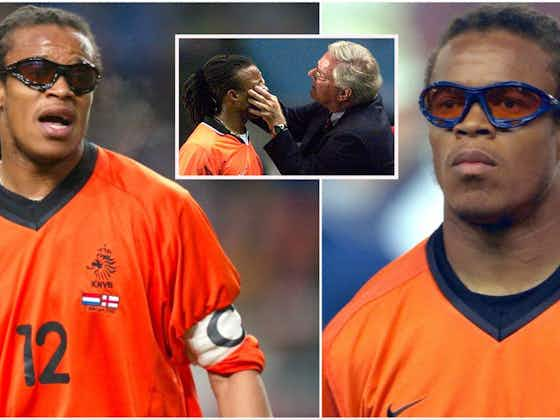GiveMeSport
·15 January 2024
Why Edgar Davids was allowed to wear glasses during his career

In partnership with
Yahoo sportsGiveMeSport
·15 January 2024

Edgar Davids was a wonderfully talented footballer who travelled around Europe plying his trade at the most elite clubs: Juventus, Ajax, Barcelona, the Milan-based duo and… National League outfit Barnet FC, where he wore oddly wore the No.1 jersey. As a midfielder.
No, your eyes are not deceiving you – after lining up alongside the likes of Zinedine Zidane, Clarence Seedorf and Dennis Bergkamp, Davids spent the twilight period of his illustrious career acting as a player-manager for Barnet.
Unraveling the start of a brilliant career off at Ajax, Davids went on to become one of the most technically gifted midfielders of his generation, though his tendency to be sent off was his Achilles heel. Included in an XI of players with the most red cards in football history, the 74-cap Dutchman was no stranger to a lunging tackle,
Affectionately monikered ‘The Pitbull’, Davids is remembered as a tenacious midfielder who was afraid of no one. But his playing style was not the most memorable aspect of seeing Davids strut his stuff in the engine room. Could it be his long dreadlocks? The iconic Nike boots? Nope - it was his tinted wraparound glasses. Davids became a standalone icon of the sport for his eye gear – but what is the exact reason behind why he wore them?
Once upon a time, there was a glasses-less Davids, though it is difficult to picture it given he was a poster boy for many adverts - most notably for Nike - over the years. And the most prominent aspect of every advert, game or footage that he partook in were indeed his glasses. They became his trademark.
Goggles on the football pitch are not very common given the potential for smashed lenses and bent frames, but Davids broke the mold and became the most well-known player to do so, after his life and career as a footballer was flipped on its head just before the turn of the millennium.
The Dutchman did indeed win his one – and only - Champions League trophy without his glasses with Ajax at the end of the 1994-95 season, but his fame grew exponentially when he was forced to wear glasses, despite how unconventional it looked at the time.
Way back in 1999 while he was plying his trade for Juventus, Davids had an operation to treat glaucoma, which is a degenerate eye condition where the optic nerve - which connects the eye to the brain – is damaged and has the potential to lead to dimmed vision, per The Athletic's Tifo Football channel. If it wasn’t for him going under the knife then, there was the damning possibility that his vision would be impaired or, even worse, lost.
Understandably, the world was worrying for the Dutchman and the future of his football career – but, thankfully, it was good news. As his illness was caught in its embryonic stages, his vision was stabilised and his return to the turf was granted, albeit on one condition: he had to wear goggles.
Davids opted for the custom-made glasses approach to prevent further damage – which, coincidentally, became synonymous around European football - there was no Davids without his glasses. He first adorned the trademark eye gear on September 4, 1999 in an international friendly against Belgium and the rest is history.
In order to use them during games, Davids had to receive permission from FIFA. Interestingly, he was also granted the go-ahead to use a reported banned substance in the form of an eyewash – it was called Diamox, and it contained the drug Acetazolamide A, which meant that a drug test would pull the Dutchman up if he was to ever complete one.
While wearing protective eye gear is commonplace in many other sports, football was, and still is, potentially behind the curve – but that could be set to change given FIFA now permits referees, particularly for younger players, to be lenient towards their use.
Davids once spoke to FourFourTwo about his initial worries of retirement and to what extent having to wear the goggles had on his playing career, admitting that it ‘took time to adjust’.
“Yeah, it was quite a big blow. I was worried, and I did think I might have to retire. But then I found out there were options: wear goggles. It was strange the first time I had to play in them: they would steam up, so it took time to adjust, but I don’t think it affected my performances.”
This setback didn't ground-eating midfielder back given that he won back-to-back league titles in the seasons to follow, both of which he was an integral part of. But while the majority of fans and players alike understood his journey and were full of empathy, Davids' compatriot Jaap Stam was seemingly not one of those people – or, at least, he didn’t show that.
The Dutch defender is understood to have made remarks along the lines of “Come on Edgar, we’re playing football, you haven’t got time to go skiing”, per The Times, triggering an explicit response from Davids.
Since hanging his boots up back in January 2014, Davids has turned his hand to management. But that hasn’t stopped the former midfielder from donning the goggles on the other side of the white line. After all, they have a nostalgic feel to them, especially for those who watched him in his pomp.


Live




Live


























































